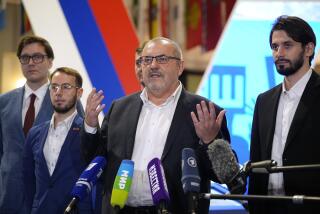What’s in a Name? In Russian Politics, Plenty : Elections: Three blocs vie for power. Will voters choose to ‘throw the garbage out,’ ‘press and push’ or bite the ‘apple’?
- Share via
Russia’s parliamentary elections Sunday will determine the political life of the country for the next two years. What shape that takes will depend on the distribution of power among the three principal electoral blocs: Russia’s Choice, led by Yegor T. Gaidar; Party of the Russian Unity and Accord, led by Sergei M. Shakhrai, and a third bloc, led by Grigory A. Yavlinsky, Yuri Y. Boldyrev and Vladimir P. Lukin.
What is the goal of each of these blocs?
Russia’s Choice favors the capitalist conversion of the Russian economy as quickly as possible, regardless of the social costs. Gaidar believes that ends (creation of a wealthy capitalist state) justify the means (impoverishment of millions of people). The present Russian government, which obviously gives a preference to Gaidar’s economic advice, acknowledges that 30 million Russians will be living next year below the poverty level while 10 million more will be starving.
The millions being pushed below the level of poverty--with a deeply rooted anti-capitalist xenophobia cultivated by Soviet propaganda and still having some belief in socialism--will become a fertile ground for the new October Revolution. Thus, despite the liberalaspirations of Gaidar, the Bolshevik-like tactics of Russia’s Choice, aimed at pushing Russian society violently toward capitalism, will only result in a Bolshevik outcome.
As for the Party of the Russian Unity and Accord, its idea is to improve the economic situation by granting more autonomy to Russian regions. This could be a good idea if it helps to get rid of the remains of a centralized economy, associated with socialism. However, one of the consequences of this project could be the Balkanization of Russia, with conflicts likely involving nuclear weapons.
The goal of the third electoral bloc, like those of the first two, is also a liberal and democratic Russia. However, its tactics are different. This bloc is taking into consideration the social price of the transition to market economy and is concerned about the possibility of a new social revolution. Grigory Yavlinsky, the leader of the bloc, is one of Russia’s most distinguished and experienced economists, who advanced his plan of transition to a market economy when Gaidar was still supplying articles to the Communist, a theoretical journal of the Communist Party.
A little linguistic analysis may be useful for understanding the attitude of the Russian people toward the three blocs. Russia’s Choice (Vybor Rossii) is commonly referred to as Vybros, which means “throwing the garbage out.” Russia’s Unity and Accord Party (Partiya Rossiiskovo Edinstva y Soglasiya) is known by its acronym PRES, a word associated with pressing and pushing. The third bloc, led by Yavlinsky, Boldyrev and Lukin, is called Yabloko from the first syllables of their names. Yabloko also means apple in Russian.
Those who may be confused by the nuances of the Russian language and who are still not sure which of the three blocs is best for Russia might recall an English saying: “An apple a day keeps the doctor away.”
More to Read
Sign up for Essential California
The most important California stories and recommendations in your inbox every morning.
You may occasionally receive promotional content from the Los Angeles Times.










